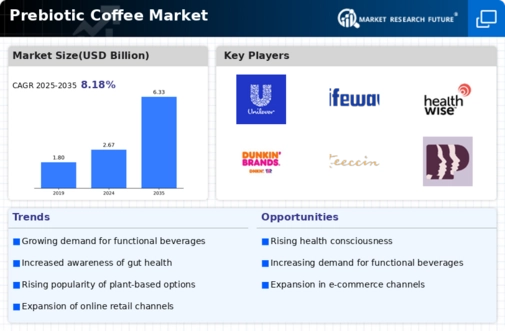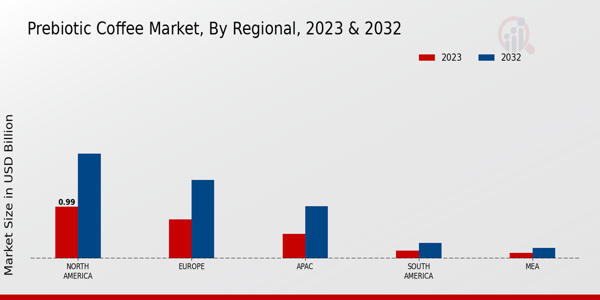Sustainability Trends
Sustainability is becoming a crucial factor in the Global Prebiotic Coffee Market Industry, as consumers increasingly prefer products that align with their environmental values. Brands that emphasize sustainable sourcing, eco-friendly packaging, and ethical production practices are likely to resonate with environmentally conscious consumers. This trend is reflected in the growing demand for organic and sustainably sourced prebiotic coffee options. Companies that adopt sustainable practices may not only capture a larger market share but also enhance their brand loyalty among consumers who prioritize environmental responsibility. This shift towards sustainability is expected to play a significant role in shaping the future landscape of the prebiotic coffee market.
Growing E-commerce Sales
The Global Prebiotic Coffee Market Industry is witnessing a significant shift towards e-commerce as a primary sales channel. With the increasing penetration of the internet and mobile devices, consumers are increasingly purchasing prebiotic coffee online for convenience and accessibility. This trend is particularly pronounced among younger demographics who prefer the ease of online shopping. E-commerce platforms provide a broader range of product options, allowing consumers to explore various brands and formulations. As a result, the market is likely to benefit from this digital transformation, which is expected to enhance overall sales and visibility of prebiotic coffee products.
Market Growth Projections
The Global Prebiotic Coffee Market Industry is poised for substantial growth, with projections indicating a market value of 6.33 USD Billion by 2035. This anticipated growth is underpinned by various factors, including rising health consciousness, innovative product offerings, and the increasing popularity of e-commerce. The market is expected to expand at a CAGR of 8.16% from 2025 to 2035, reflecting a robust interest in functional beverages. As consumers continue to prioritize health and wellness, the demand for prebiotic coffee is likely to increase, creating opportunities for manufacturers to innovate and capture a larger share of the market.
Rising Health Consciousness
The Global Prebiotic Coffee Market Industry is experiencing a surge in demand driven by increasing health consciousness among consumers. As individuals become more aware of the benefits of gut health, prebiotic coffee, which contains dietary fibers that promote beneficial gut bacteria, is gaining popularity. This trend is reflected in the projected market value of 2.67 USD Billion in 2024, indicating a robust interest in health-oriented products. Consumers are actively seeking alternatives to traditional coffee that offer added health benefits, thus propelling the growth of the prebiotic coffee segment. This shift towards healthier beverage options is likely to continue influencing market dynamics.
Innovative Product Development
Innovation plays a pivotal role in the Global Prebiotic Coffee Market Industry, with manufacturers continuously developing new formulations to attract diverse consumer segments. The introduction of flavored prebiotic coffee blends and ready-to-drink options caters to varying taste preferences and convenience needs. For instance, brands are experimenting with different types of prebiotics, such as inulin and oligofructose, to enhance the health benefits of their products. This focus on innovation is expected to contribute to the market's growth, with projections indicating a rise to 6.33 USD Billion by 2035. Such advancements not only appeal to health-conscious consumers but also create a competitive edge in a crowded marketplace.
Health Benefits and Functional Ingredients
The Global Prebiotic Coffee Market Industry is significantly influenced by the growing awareness of health benefits associated with prebiotic ingredients. Prebiotic coffee is recognized for its potential to improve digestive health, boost immunity, and enhance overall well-being. As consumers increasingly seek functional beverages that offer more than just caffeine, the demand for prebiotic coffee is likely to rise. The market's growth is supported by a compound annual growth rate (CAGR) of 8.16% projected for the period from 2025 to 2035. This increasing focus on health and wellness is expected to drive innovation and product development within the prebiotic coffee segment.






















